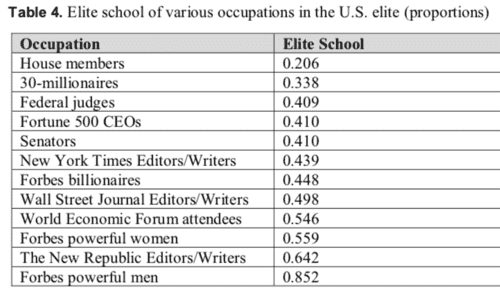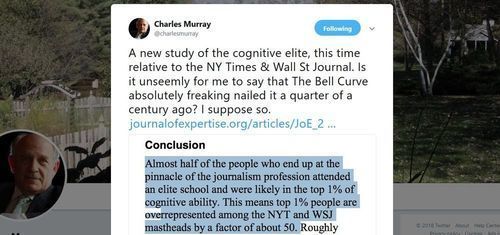

By Steve Sailer
04/24/2018
From the Journal of Expertise:
Expertise in Journalism: Factors Shaping a Cognitive and Culturally Elite Profession
Jonathan Wai and Kaja Perina
Geisinger Health System, Case Western Reserve University, Psychology Today Correspondence: Jonathan Wai,
Abstract
What qualities are important in the development of journalism expertise? And how can the study of elite journalists shed light on our understanding of expertise more broadly? This study examined a sample of 1,979 employees of The New York Times (NYT) and The Wall Street Journal (WSJ), arguably two of the most influential papers in the U.S. and the world. Almost half of the people who reach the pinnacle of the journalism profession attended an elite school and were likely in the top 1% of cognitive ability. This means top 1% people are overrepresented among the NYT and WSJ mastheads by a factor of about 50. Placed in the context of other elite occupations, this provides evidence for the influence of the cognitive elite across a wide variety of expertise, including domains that provide prestige and influence rather than monetary rewards. Roughly 20% attended an Ivy League school. Writers were drawn from higher-ranking schools, reflecting higher cognitive ability than demonstrated by editors’ schools. Almost all elite journalists graduated from college, and the majority did not major in journalism (roughly 80% of typical journalists graduate from college). Only a handful of select schools feed the mastheads of the NYT and the WSJ, suggesting the importance of networks. Data on typical journalists were analyzed to provide characteristics of editors and reporters/correspondents. This approach shows that cognitive ability should be accounted for in more comprehensive theoretical models of expertise and that deliberate practice cannot be the full explanation of success. It also provides a unique test of the generality of expertise models into more nontraditional expertise domains such as journalism and other occupations and ultimately may shed light on the extent to which general cognitive ability, the role of selective institutions, opportunity, and other factors may play in expertise development broadly.
Generally speaking, New York Times and Wall Street Journal writers seem quite smart, smarter on average than, say, Washington Post or NPR writers. NYT articles will therefore often get around to the obvious counter-explanation undermining the impression the article is supposed to give toward the end of the article, while lower IQ media sources tend to be oblivious to the obvious.
A long time ago, I was talking to a prominent NYT journalist and he said his (pre-1995 old school) SAT score was 1530.
This is a content archive of VDARE.com, which Letitia James forced off of the Internet using lawfare.